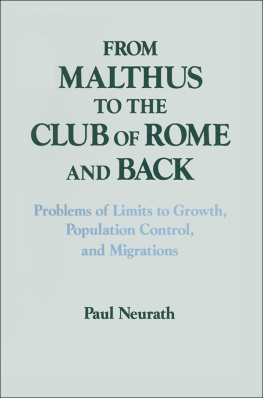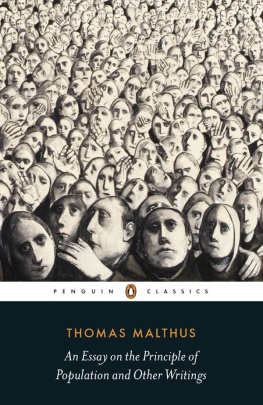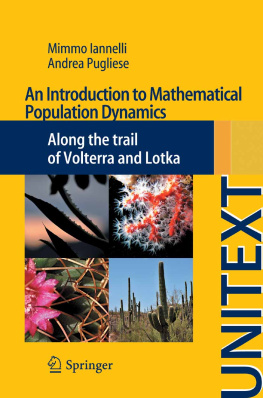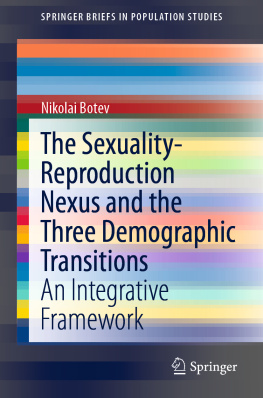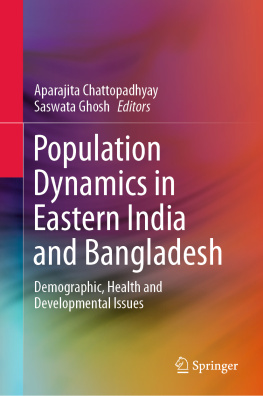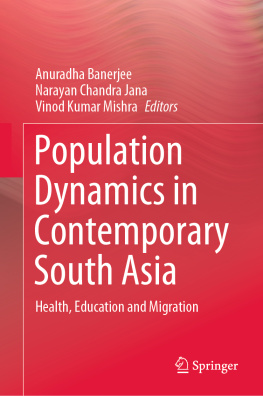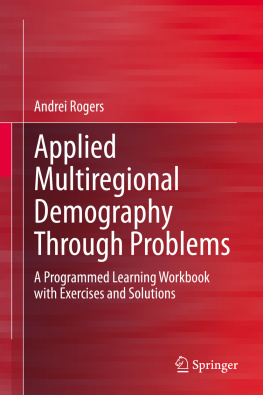First published in 1957
by Routledge
Reprinted 1998, 1999, 2001 (twice) by Routledge
2 Park Square, Milton Park, Abingdon, Oxon, OX14 4RN
Transferred to Digital Printing 2007
Routledge is an imprint of the Taylor & Francis Group
1957 Routledge
All rights reserved. No part of this book may be reprinted or reproduced or utilized in any form or by any electronic, mechanical, or other means, now known or hereafter invented, including photocopying and recording, or in any information storage or retrieval system, without permission in writing from the publishers.
The publishers have made every effort to contact authors/copyright holders of the works reprinted in The International Library of Sociology.
This has not been possible in every case, however, and we would welcome correspondence from those individuals/companies we have been unable to trace.
British Library Cataloguing in Publication Data
A CIP catalogue record for this book is available from the British Library
Population Theories and the Economic Interpretation
ISBN 0-415-17531-3
Economics and Society: 11 Volumes
ISBN 0-415-17819-3
The International Library of Sociology: 274 Volumes
ISBN 0-415-17838-X
Publishers Note
The publisher has gone to great lengths to ensure the quality of this reprint but points out that some imperfections in the original may be apparent
SINCE the time of Malthus, few indeed remain indifferent to the so-called population problem. Outside the academic sphere there are those who, on the one hand, still see in population phenomena the explanation of the existing world distribution of material goods; and, on the other, those who continue to believe that essentially the population problem is a red herring invoked, as in the past, to justify the status quo.
Within academic circles, the situation is much different. Here a dispassionate attempt is made to understand population phenomena. Tools of greater precision are devised for the measurement and ordering of the diversity of demographic patterns and developments, explanatory hypotheses are tested, etc. Nevertheless, there is evidence that even in academic circles, political preconceptions, as well as pure reason, determine a population attitude: e.g. upon the publication of the anti-Malthusian Geography of Hunger by Josu de Castro, an important population study centre in the United States published in a special issue, which was widely and gratuitously circulated, an ill-conceived and over-anxious critique of Castros work. It seems clear, then, that there are population attitudes as well as purely theoretical interests in demography.
A further difficulty encountered in pursuing the study of demography is the great interest the subject arouses in students engaged in different lines of academic endeavour. Frequently biologists, physiologists, sociologists, economists, mathematicians, physicists and philosophers advance a population theory.
Thus it is that in view of the diversity of thought and the variety of contributions to population theory, the author is not entitled to assume that his audience is familiar with the various hypotheses adduced to explain population dynamics. Hence in is not only expository but polemic, it seemed best to quote extensively.
In of the book. However, concerning Marxs theory of the falling rate of profit, the historic rise in the average value of labour-power introduces another counter-tendency to the rise in the organic composition of capital.
That is to say, assume with Marx that the rate of exploitation, S/V, is constant. (This is a reasonable first approximation which is discussed in more detail in .) Assume further, as Marx did, that the technical composition of capital, C/C + V, rises. It follows that if the value of labour-power is rising, there exists an important counter-tendency, not emphasized by Marx, to the rise in the organic composition of capital. For C, the congealed or dead labour, is of lower value than the living labour with which it is combined; or stated otherwise, living labours value is rising relative to C, dead labour. But this means, ceteris paribus, that the tendency for the organic composition of capital to rise is countered by the rise in the value of V.
I am deeply indebted to Professor D. V. Glass and Mr. H. L. Beales of the London School of Economics. The interest, advice, and generous disposal of their time facilitated and made pleasurable a project which might otherwise have proved onerous. Further, it was largely through the sustained interest of Professor Glass that the work now appears in print.
My friend, William Blake, also gave unstintingly of his time. His encyclopaedic knowledge, excellent judgment, and enthusiastic interest contributed greatly to improving the content and form of the work.
Finally, my wife, Patricia Coontz, made a number of valuable suggestions for improvements as well as carrying on with the burdensome detail preparatory to publication.
SYDNEY H. COONTZ
December 1956
State University College of Forestry at Syracuse University
Syracuse 10, New York
THE preliminary stage of any scientific inquiry is the collection and classification of data. Through classification differing phenomena are separately examined and their peculiarities observed. Further investigation often reveals unsuspected similarities and significant relations between phenomena originally considered quite dissimilar and autonomous. Again, differences emerge which were not apparent at first.
But, as Thorstein Veblen long ago emphasized, the aim of science is to pass beyond the taxonomic level.1 Questions arise as to the origin, evolution and future development of the phenomena under investigation. Explanatory hypotheses are formulated and their validity tested. The criteria of validity are correspondence with observed fact, coherence, and successful prediction. Further, on the principle of Occams Razor, that hypothesis is preferable which makes the least number of assumptions, other things being equal.


